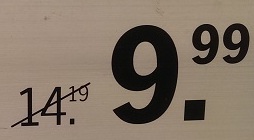When you walk into a supermarket today, there's a good chance you'll encounter numerous round prices. Supermarket chains regularly hold 'Round Price Discounts' promotions, and your personal discounts often treat you to many round prices. Psychologically clever or not? In this blog, we delve into the psychology behind round pricing.
Where Do These Round Prices Suddenly Come From?
€2.99 or just a simple €3? It may seem like a trivial detail, but the roundness of a price significantly influences our purchasing behaviour.
Round prices have become popular in recent years. However, they contradict the classic marketing trick of 'Charm Pricing'. This technique prices a product not at €20.00 but at 'only' €19.99.
The intention of Charm Pricing is to lower the left digit (in the example above, changing the 2 to a 1). Since consumers typically process prices quickly, they mainly focus on the leftmost digit. Result: the actual price drop of just one cent makes the customer feel like they've received a tenner discount.
Research in various contexts shows that this form of Charm Pricing indeed works, but with some potential downsides (Manning & Sprott, 2009). Products priced ending in .99 are indeed chosen more often, as the data clearly shows.

However, while this is positive for that one product, it is not always beneficial for the store's or category's overall revenue. In fact, the .99 tends to bring out the bargain hunter in people. When consumers are constantly confronted with the 'Charm Price', they are less inclined to pay a premium for quality.
Retailers who frequently use .99 pricing are thus shooting themselves in the foot.
The round price is on the rise, and not without reason. From science, we know three psychological factors that determine when they work favourably – and when not.
Factor 1: Are Round Prices Better? A Matter of Emotion
The roundness of a price goes far beyond just tickling our discount sense. Prices subtly influence how rationally or emotionally we behave.
When we see round prices, we are more guided by our emotions, while specific prices activate a more rational mindset (Wadhwa, & Zhang, 2015). An important difference, as the distinction between a rational or emotional mindset determines which products become more or less attractive.
Take, for example, the purchase of a camera. This can have emotional reasons, such as capturing your exotic holiday or other beautiful life events. For others, this purchase is more driven by reason, with a stronger focus on hardware features.
The price strengthens our mindset (rational or emotional) and from there, which product features we focus on. A round price will enhance the emotional appeal (we imagine how we will use the camera on our upcoming holiday) while a specific price makes the rational arguments more convincing (the number of megapixels is better than other cameras).
Your product largely determines whether your purchase leans on emotion or reason. Snacks and frozen pizzas? Round! A jar of vegetables or cleaning products? Perhaps something behind the comma.
Factor 2: Round Prices, a Matter of Convenience
Round prices not only make us a bit more emotional but also evoke a sense of convenience. Round numbers are easier for our brains to process than specific numbers. This processing ease – also known as processing fluency in psychology – colours our evaluation of the associated product (Wieseke et al., 2016).
We don't do this consciously, but it happens automatically because our brain cannot strictly separate the processing of the product and the price tag. A simple round price makes the product easier, while a specific price makes the product seem more complex.
This convenience boost due to round prices is relevant for products that consider convenience among their core benefits. A microwave meal, for example. You don't eat it for vitamins or gastronomic taste experience, but purely to quickly put something edible on the table. A round price enhances the convenience perception of such a product.
Factor 3: Round Prices and Price Memory
The fact that round prices are easier for our brains to process brings another effect: we remember them better. A famous memory study shows that two days after shopping, we have stored products with round prices significantly better in our price memory (Schindler & Wiman, 1989).
Of course, the question is whether such a memory boost is beneficial. For quite a few products, you want the consumer to remember everything – except the price tag. A beautiful – but expensive – outfit, for example. You want the customer to leave the store with the 'gain' etched in memory, but not the 'pain'.
For stores that don't want to be mentally labelled as 'expensive', it's beneficial to give relatively expensive items specific prices and the more affordable items round prices. This way, a more favourable price image will be built in memory.
However, price memory can also be beneficial. For example, if products go out the door at an irresistible price. HEMA cleverly applies this technique by communicating their long-running low prices round and simple. Because the HEMA breakfast is priced at €2, significantly more people will remember that you can have a cheap breakfast at HEMA.
BONUS TIP for Home Buyers/Sellers
In this blog, we saw when round prices work effectively. A situation where round prices work quite counterproductively is with high prices that need to come across as credible. The roundness of the price also has a significant impact when buying or selling a house.
In contexts where the actual value is difficult to determine, specific prices appear more credible. Round and high prices feel arbitrary. A specific price? Thought has gone into it. This effect is so strong that houses marketed with a specific price are, on average, eventually sold for a higher amount.

The reverse is also true. Are you as a buyer about to make an opening bid? Start with a specific price to seal the deal in your favour more quickly.
Want to Learn More About Pricing and Neuromarketing?
The roundness of the price is one of many factors that determine the effectiveness of a price.
In the Neuromarketing Retail Training by Unravel Academy, a full lesson is dedicated to the psychological effects of pricing. You will learn all the scientific insights about value communication, price context, and price design to provide products with the most favourable price tag possible.
Additionally, it is possible to conduct neuromarketing pricing research at Unravel Research. Here, we determine the optimal price for a product based on brain activity. This provides guidance for price increases and successfully launching new products in the market.
Manning, K. C., & Sprott, D. E. (2009). Price endings, left-digit effects, and choice. Journal of Consumer Research, 36(2), 328-335.
Schindler, R. M., & Wiman, A. R. (1989). Effects of odd pricing on price recall. Journal of Business Research, 19(3), 165-177.
Wadhwa, M., & Zhang, K. (2015). This number just feels right: The impact of roundedness of price numbers on product evaluations. Journal of Consumer Research, 41(5), 1172-1185.
Wieseke, J., Kolberg, A., & Schons, L. M. (2016). Life could be so easy: the convenience effect of round price endings. Journal of the Academy of Marketing Science, 44(4), 474-494.


 EN
EN  NL
NL 




